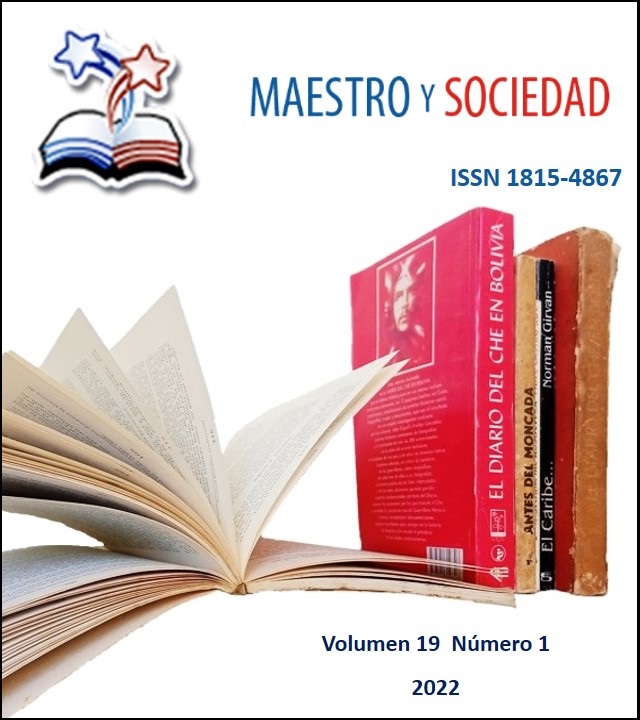Ecology of learning in apurímac during the health emergency due to Covid 19 during the year 2021
Array
Keywords:
Learning ecosystem, learning ecology, dimensions, pedagogical proposal, connectivityAbstract
The objective of this study is to “Identify the elements that make up the new learning ecosystems as a result of the COVID-19 pandemic in the 7 provinces of Apurímac during the year 2021. The methodological proposal to identify the learning ecosystems in Apurímac are within the framework of epistemic mapping. The online questionnaire application. The results obtained in the family dimension show that 61% of mothers of families accompany in the learning processes of children of initial education and primary education, as well as 35% of parents have joined the task of accompanying their youngest children in the learning processes. In addition, they allow a direct relationship between 2 important factors (Connectivity and Curricular Proposal) that correspond to different dimensions; the connectivity factor corresponds to the community dimension and the proposed curricular factor to the school dimension.
References
2. Brunner, E. (2004). Factores que inciden en una educación efectiva. Revista virtual La Educación - Organización de los Estados Americanos, 139-140.
3. Callejas, A. (2019). 4.0, La Educación. Universidad Autónoma de México.
4. Cobo, C. y Moravec, J. (2011). APRENDIZAJE INVISIBLE. Universidad de Barcelona.
5. Coll, C. (2013). El currículo escolar en el marco de la nueva ecología del aprendizaje. Universidad de Barcelona.
6. Coll, C. (2013). La educación formal en la nueva ecología del aprendizaje: Tendencias, retos y agenda de investigación. Universidad de Barcelona.
7. De León Cerda, D. D. (2015). Ecosistemas de aprendizaje: una propuesta para abrir los ambientes. Seminario "Sistemas y ambientes educativos - SAMBEO, 28.
8. Deroncele Acosta, A. (2020). Paradigmas de investigación científica. Abordaje desde la competencia epistémica del investigador. Revista Arrancada, 20(37), 211-225. https://revistarrancada.cujae.edu.cu/index.php/arrancada/article/view/331/233
9. Deroncele Acosta, A., Gross Tur, R., & Medina Zuta, P. (2021). El mapeo epistémico: herramienta esencial en la práctica investigativa. Universidad Y Sociedad, 13(3), 172-188. https://rus.ucf.edu.cu/index.php/rus/article/view/2088
10. Deroncele, A. (2020). Competencia epistémica del investigador. En A. M. de Vicente Domínguez y N. Abuín Vences (Coords), LA COMUNICACIÓN ESPECIALIZADA DEL SIGLO XXI (pp. 53-77). Madrid, España: McGraw-Hill. ISBN: ISBN: 978-84-486-2434-7. https://bit.ly/3ANOsWw
11. Deroncele-Acosta, A., Medina-Zuta, P., Goñi-Cruz, F. F., Montes-Castillo, M. M., Roman-Cao, E., & Gallegos Santiago, E. (2021). Innovación Educativa con TIC en Universidades Latinoamericanas: Estudio Multi-País. REICE. Revista Iberoamericana Sobre Calidad, Eficacia Y Cambio En Educación, 19(4). https://doi.org/10.15366/reice2021.19.4.009
12. Florez, R. P. (2020). Investigación acción de la ecología del aprendizaje. Universidad Autónoma del Estado de México.
13. García-Peñalvo, F. H.-G.-B.-E.-L.-P. (2015). Mirando hacia el futuro: Ecosistemas tecnológicos de aprendizaje basados en servicios. Acta del III Congreso Internacional. Fundación.
14. García-Peñalvo, F. J. H. (2017). Open Source Solutions for Knowledge Management and. Technological Ecosystems: IGI Global.
15. Herrera, A. (2018). Elementos que conforman un Ecosistema de Aprendizaje, Tecnológico de Monterrey México. https://youtu.be/9c1pAPOgfF4
16. Kalantzis, M. y. (2015). New Learning. http://newlearningonline.com/
17. López, Roberto y Hernández, Mario. (2016). Principios para Elaborar un modelo pedagógico universitario basado en las TIC. UNIANDES EPISTÉMICA- Universidad de Trujillo.
18. McMillan, J. y Schumacher, S. (2005). Investigación Educativa. Pearson Educación.
19. McMillan, James y Schumacher, Sally (2005). Investigación Educativa. Madrid: Pearson Educación.
20. Medina Zuta, P., Deroncele Acosta, A. (2019). La construcción científico-textual en el posgrado: el desafío de la transdisciplinariedad y la reflexividad. Revista Maestro y Sociedad, 16(4), 829-838.
21. Medina Zuta, P., Deroncele Acosta, A. (2020). La práctica investigativa dialógico-reflexiva para orientar la problematización como operador epistémico de la construcción científico-textual. Revista Inclusiones, 7(2), 160-174
22. Medina Zuta, P., y Deroncele Acosta, A. (2020). La práctica dialógico-reflexiva: una experiencia formativa en los procesos de construcción científico-textual en el postgrado. Órbita Pedagógica, 7(1), 37-46.
23. Ortiz, A. (2011). Hacia una nueva clasificación de los modelos pedagógicos el pensamiento configuracional como paradigma científico y ceducativo 2021. REVISTA PRAXIS - Colombia, 121-137.
24. Padrón, José y Ortega, Alfredo. (2012). La Conectividad del dogmatismo como nuevo referente paradigmástico para la docencia de Vanguardia. Universidad Pedagógica Experimental Libertador - Caracas, 129-142.
25. Palacios Núñez, M. L., Toribio López, A., y Deroncele Acosta, A. (2021). Innovación educativa en el desarrollo de aprendizajes relevantes: una revisión sistemática de literatura. Universidad Y Sociedad, 13(5), 134-145. https://rus.ucf.edu.cu/index.php/rus/article/view/2219
26. Rodés, R. M. (2020). Pensando los Ecosistemas de Aprendizaje desde los Entornos. Accelerating the world's research, Universidad de la República, Montevideo-Uruguay.
27. Sampieri, R. H. (2014). Metodología de la investigación. México: Mc Graw Hill.
28. Treviño, E. (2015). Factores asociados al aprendizaje. México: Tercer estudio regional comparativo explicativo - UNESCO.
Published
How to Cite
Issue
Section
License
This journal provides immediate open access to its content, based on the principle that offering the public free access to research helps a greater global exchange of knowledge. Each author is responsible for the content of each of their articles.



























 Universidad de Oriente
Universidad de Oriente 